Python OOP classmethods and staticmethods
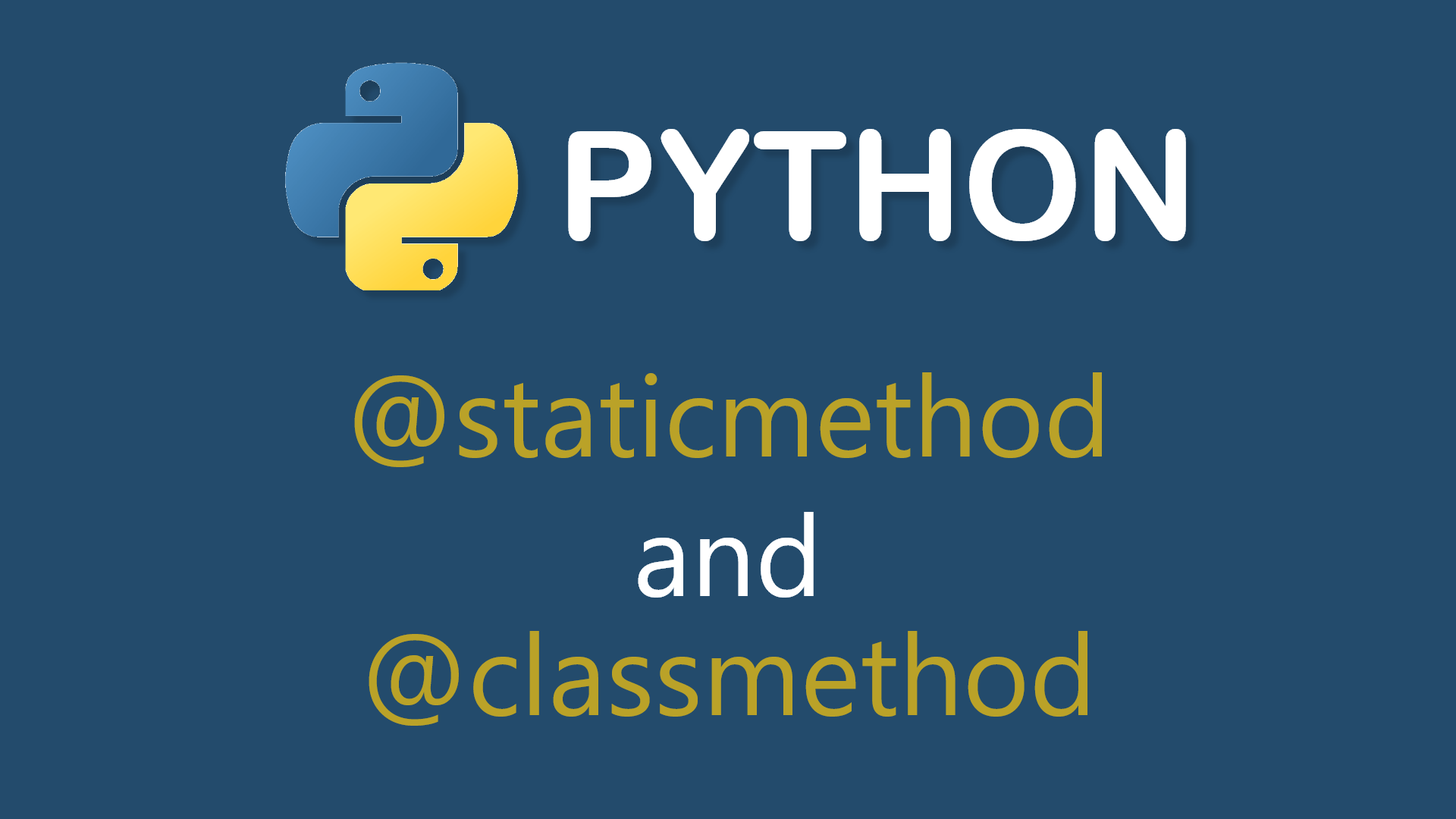
Class methods
It is a method bound to class rather than its object and is shared among all objects. It receives class as a implicit first argument and can modify a class state which is applied to all the instances of the class.

Static methods
It is a method, much like class methods, that are bound to a class rather than its object. It does not take instance or class as the first argument. It is more like a regular method and can neither modify object state nor class state.

Now, let’s look at the simple example below where we have a class Employee which takes first_name, last_name and salary of the employee. The method full_name returns the full name of employee and the method raised_salary sets the new salary after rasing salary by raise_amount.
1
2
3
4
5
6
7
8
9
10
11
12
13
14
15
16
17
18
19
20
21
22
23
24
25
class Employee:
raise_amount = 1.4
def __init__(self, first_name, last_name, salary):
self.first_name = first_name
self.last_name = last_name
self.salary = salary
def full_name(self):
return self.first_name + " " + self.last_name
def raised_salary(self):
raised_salary = self.salary * self.raise_amount
self.salary = self.salary + raised_salary
emp1 = Employee("shiva", "basnet", 50000)
emp2 = Employee("rita", "basnet", 80000)
emp1.raised_salary()
print(emp1.raise_amount) #output 1.4
print(emp1.salary)#output 120000.0
emp2.raised_salary()
print(emp2.raise_amount)#output 1.4
print(emp2.salary)#output 192000.0
Now let’s make use of class method here to change the raise_amount.
1
2
3
4
5
6
7
8
9
10
11
12
13
14
15
16
17
18
19
20
21
22
23
24
25
26
27
28
29
30
31
32
class Employee:
raise_amount = 1.4
def __init__(self, first_name, last_name, salary):
self.first_name = first_name
self.last_name = last_name
self.salary = salary
def full_name(self):
return self.first_name + " " + self.last_name
def raised_salary(self):
raised_salary = self.salary * self.raise_amount
self.salary = self.salary + raised_salary
@classmethod
def update_raise_amount(cls, amount):
cls.raise_amount = amount
emp1 = Employee("shiva", "basnet", 50000)
emp2 = Employee("rita", "basnet", 80000)
# invoking class method to change raise amount
Employee.update_raise_amount(1.5)
emp1.raised_salary()
print(emp1.raise_amount) #output 1.5
print(emp1.salary)#output 125000.0
emp2.raised_salary()
print(emp2.raise_amount)#output 1.5
print(emp2.salary)#output 200000.0
Here, the classmethod call is implicit as defined in its definition above. Though the method update_raise_amount takes two arguments, we have only passed amount.
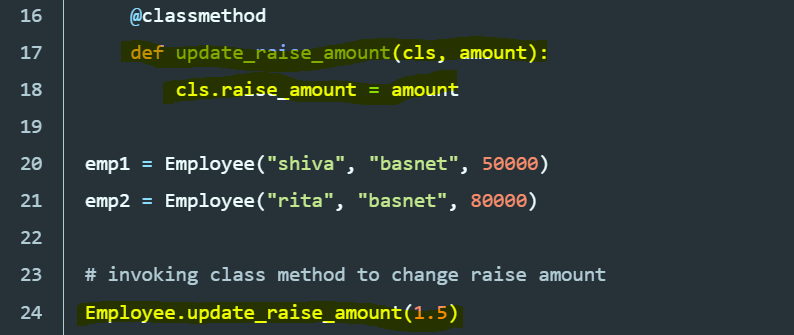
The class method has changed the state of attribute raise_amount of class Employee which has been reflected to all of its instances. The raise_amount for all instance has been now updated to 1.5 from 1.4.
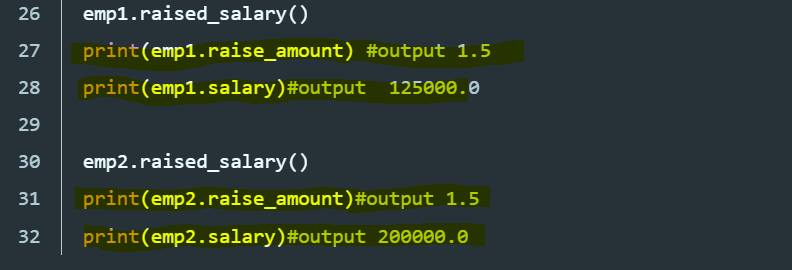
It can be also use as an alternative constructor. Let’s look at the example below.
1
2
3
4
5
6
7
8
9
10
11
12
13
14
15
16
17
18
19
20
21
22
23
24
25
26
27
28
29
30
31
32
33
34
35
36
37
38
39
40
41
class Employee:
raise_amount = 1.4
def __init__(self, first_name, last_name, salary):
self.first_name = first_name
self.last_name = last_name
self.salary = salary
def full_name(self):
return self.first_name + " " + self.last_name
def raised_salary(self):
raised_salary = self.salary * self.raise_amount
self.salary = self.salary + raised_salary
@classmethod
def update_raise_amount(cls, amount):
cls.raise_amount = amount
@classmethod
def alternative_constructor(cls, employee_detail):
first_name, last_name, salary = \
employee_detail.split(',')
return cls(first_name, last_name, int(salary))
emp1_detail = "shiva, basnet, 50000"
emp2_detail = "rita, basnet, 80000"
emp1 = Employee.alternative_constructor(emp1_detail)
emp2 = Employee.alternative_constructor(emp2_detail)
Employee.update_raise_amount(1.5)
emp1.raised_salary()
print(emp1.raise_amount) #output 1.5
print(emp1.salary)#output 125000.0
emp2.raised_salary()
print(emp2.raise_amount)#output 1.5
print(emp2.salary)#output 200000.0
Here, the details of employee is separated by comma ”,” unlike above. It needs to be parsed before creating an Employee object. So we have used a class method that splits the employee information and then returns Employee object. Therefore, it is sometime called as an alternative constructor.
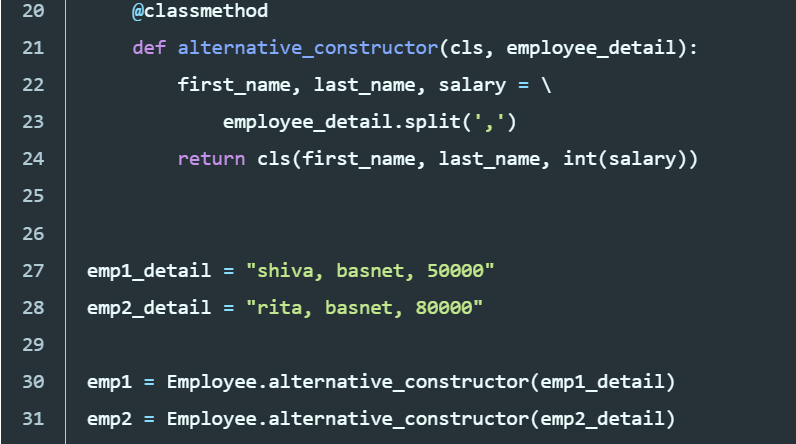
If we want to see a real world example, we can see a class methods inside python datetime.
https://github.com/python/cpython/blob/main/Lib/datetime.py
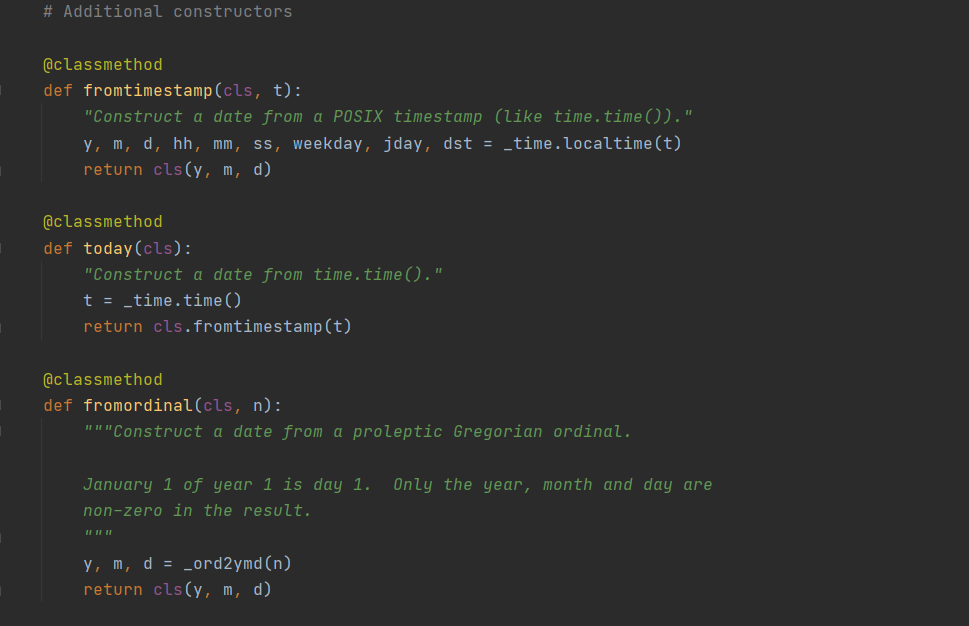
Now let’s come to static method. When working with classes regular methods automatically pass the instance as the first argument and we call that self and class methods automatically pass the class as the first argument and we call that cls. The static method don’t pass anything automatically neither instance or class. They behave like regular function except they are included in a classes because they have some logical connection with class.
1
2
3
4
5
6
7
8
9
10
11
12
13
14
15
16
17
18
19
20
21
22
23
24
25
26
27
28
29
30
31
32
33
34
35
36
37
38
39
40
41
42
43
44
45
46
47
48
49
class Employee:
raise_amount = 1.4
def __init__(self, first_name, last_name, salary):
self.first_name = first_name
self.last_name = last_name
self.salary = salary
def full_name(self):
return self.first_name + " " + self.last_name
def raised_salary(self):
raised_salary = self.salary * self.raise_amount
self.salary = self.salary + raised_salary
@classmethod
def update_raise_amount(cls, amount):
cls.raise_amount = amount
@classmethod
def alternative_constructor(cls, employee_detail):
first_name, last_name, salary = \
employee_detail.split(',')
return cls(first_name, last_name, int(salary))
@staticmethod
def is_workday(day):
""""
Monday:0,
Tuesday:1,
Wednesday:2,
Thursday:3,
Friday:4,
Saturday:5,
Sunday:6
"""
if day.weekday() == 5 or day.weekday() == 6:
return "NO"
else:
return "YES"
emp1_detail = "shiva, basnet, 50000"
emp2_detail = "rita, basnet, 80000"
emp1 = Employee.alternative_constructor(emp1_detail)
emp2 = Employee.alternative_constructor(emp2_detail)
import datetime
my_date = datetime.date(2022, 7, 24)
print(emp1.is_workday(my_date))# output YES, weekday=5
Above we have added a static method that takes a day and simply returns whether the given date is workday or not. It does not depend on class or instance but it makes sense to keep that method in Employee class. As described in definition, it has not changed the object state neither class state and has not taken any implicit arguments like in class methods.





Leave a comment